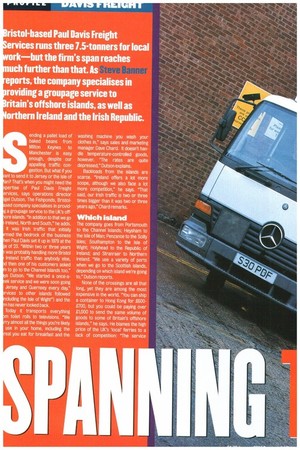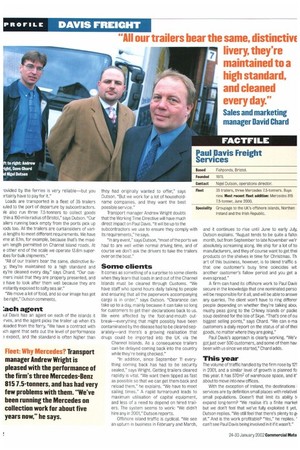ristol-based Paul Davis Freight
Page 30

Page 32

If you've noticed an error in this article please click here to report it so we can fix it.
ervices runs three 7.5-tonners for Dc ork—but the firm's span reaches uch further than that. As
eports, the company specialises in
roviding a groupage service to ritain's offshore islands, as well as orthern Ireland and the Irish Republic.
ending a pallet load of baked beans from Milton Keynes to Manchester is easy enough, despite our appalling traffic congestion. But what if you ant to send it to Jersey or the Isle of an2 That's when you might need the pertise of Paul Davis Freight ervices, says operations director igel Dutson. The Fishponds, Bristolsed company specialises in providg a groupage service to the UK's offore islands. "In addition to that we go Ireland, North and South," he adds. It was Irish traffic that initially rmed the bedrock of the business hen Paul Davis set it up in 1979 at the e of 23. "Within two or three years was probably handling more Bristol Ireland traffic than anybody else, id then one of his customers asked
to go to the Channel Islands too," ys Dutson. "We started a once-aek service and we were soon going Jersey and Guernsey every day." rvices to other islands followed nduding the Isle of Wight") and the m has never looked back.
Today it transports everything m toilet rolls to televisions. "We rry almost all the things you're likely use in your home, including the real you eat for breakfast and the washing machine you wash your clothes in," says sales and marketing manager Dave Chard. It doesn't handle temperature-controlled goods, however. "The rates are quite depressed," Dutson explains.
Backloads from the islands are scarce. "Ireland offers a lot more scope, although we also face a lot more competition," he says. "That said, our Irish traffic is two or three times bigger than it was two or three years ago, Chard remarks.
Which island The company goes from Portsmouth to the Channel Islands; Heysham to the Isle of Man: Penzance to the Scilly Isles; Southampton to the Isle of Wight; Holyhead to the Republic of Ireland; and Stranraer to Northern Ireland. "we use a variety of ports o when we go to the Scottish islands, depending on which island we're going to," Dutson reports. None of the crossings are all tfi long, yet they are among the most expensive in the world. "You can ship a container to Hong Kong for £600£700, but you could be paying over /1,000 to send the same volume of goods to some of Britain's offshore islands,' he says. He blames the If price of the UK's 'local' ferries to lack of competition: "The servic 'ovided by the ferries is very reliable—but you witainly have to pay for it."
Loads are transported in a fleet of 35 trailers piled to the port of departure by subcontractors. lie also run three 7.5-tonners to collect goods thin a 150-mile radius of Bristol," says Dutson. "Our ailers running back empty from the ports pick up )ads too. All the trailers are curtainsiders of yank is lengths to meet different requirements. We have ime at 8.1m, for example, because that's the mask urn length permitted on Channel Island roads. At e other end of the scale we operate 13.6m superibes for bulk shipments."
All of our trailers bear the same, distinctive livy; they're maintained to a high standard and ey're cleaned every day," says Chard. "Our cusmers insist that they are properly presented, and ?, have to look after them well because they are instantly exposed to salty sea air."
"We move a lot of food, and so our image has got be right," Dutson comments.
:ach agent
iul Davis has an agent on each of the islands it :ryes, and the agent picks the trailer up when it's 'loaded from the ferry. "We have a contract with ich agent that sets out the level of performance expect, and the standard is often higher than
they had originally wanted to offer," says Dutson. "But we work for a lot of householdname companies, and they want the best possible service."
Transport manager Andrew Wright doubts that the Working Time Directive will have much direct impact on Paul Davis. "It will be up to the subcontractors we use to ensure they comply with its requirements," he says.
"In any event," says Dutson, "most of the ports we haul to are well within normal driving time, and of course we don't ask the drivers to take the trailers over on the boat."
Some clients
It comes as something of a surprise to some clients when they learn that loads in and out of the Channel Islands must be cleared through Customs. "We have staff who spend hours daily talking to people and ensuring that all the paperwork accompanying cargo is in order," says Dutson. "Clearance can take up to a day, mainly because it can take so long for customers to get their declarations back to us. We were affected by the foot-and-mouth outbreak—everything that might possibly have been contaminated by the disease had to be cleared separately—and there's a growing realisation that drugs could be imported into the UK via the Channel Islands. As a consequence trailers can be delayed coming back into the country while they're being checked."
"In addition, since September 11 everything coming back has had to be security sealed," says Wright. Getting trailers cleared rapidly is vital. "We want them tipped as fast as possible so that we can get them back and reload them," he explains. "We have to meet sailing times." A rapid turnaround leads to maximum utilisation of capital equipment, and less of a need to depend on hired trailers. The system seems to work: "We didn't hire any in 2001," Dutson reports.
Offshore island raffle is cyclical. "We see an upturn in business in February and March, and it continues to rise until June to early July, Dutson explains. "August tends to be quite a fano\ month, but from September to late November we'r absolutely screaming along. We ship for a lot of to manufacturers, and they of course want to get thei products on the shelves in time for Christmas. Th art of this business, however, is to blend traffic s that one customer's busy time coincides wit another customer's fallow period and you get a even spread."
A firm can hand its offshore work to Paul Davis secure in the knowledge that one nominated perso will be responsible for it all, and will be able to answe any queries. The client won't have to ring differer people depending on whether they're talking abut mushy peas going to the Orkney Islands or packE soup destined for the Isle of Skye. "That's one of ou biggest selling points," says Chard. "We can e-ma customers a daily report on the status of all of thei goods, no matter where they are going."
Paul Davis's approach is clearly working. "We'vi got just over 500 customers, and some of them hay, been with us since we started," Chard adds.
This year
The volume of traffic handled by the firm rose by 129 in 2001, and a similar level of growth is planned fo this year. It has 570m2 of warehouse space, and it' about to move into new offices.
With the exception of Ireland, the destinations services are by definition small places with relativel small populations. Doesn't that limit its ability ti expand long-term? "We realise it's a finite market but we don't feel that we've fully exploited it yet, Dutson replies. "We still feel that there's plenty to at." And is the work profitable? "Yes," he replies. can't see Paul Davis being involved in it if it wasn't."












































































































































